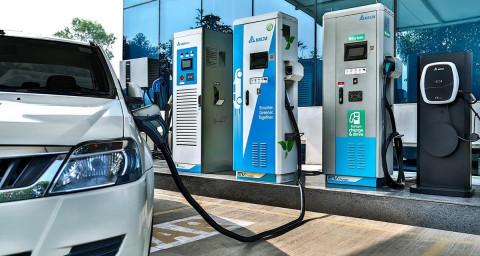Indian auto giant Tata Motors has recently unveiled two state-of-the-art R&D facilities for meeting the emerging needs of its sustainable mobility solutions using hydrogen as fuel at its R&D centre in Pune.
This includes the engine test cell for development of hydrogen Internal Combustion Engine (ICE) and the necessary infrastructure for storage and dispensing of Hydrogen fuel for the fuel cell and H2 ICE vehicles.
The company claims that the latest facilities are yet another step forward from Tata Motors towards carbon neutrality, by tapping the strong potential of hydrogen as a clean energy source. "Tata Motors has been leading the global megatrend of sustainable, connected and safer mobility in India. We believe Hydrogen to be the fuel of the future, especially for commercial vehicles", said Girish Wagh, Executive Director, Tata Motors.
RELATED: Tata, Cummins set up TCPL Green Energy Solutions for zero-emission mobility techs
"With the opening of this dedicated R&D facility to develop and indigenize Hydrogen propulsion technology, we are entering a new era of technological innovations and advancements in green mobility. The resulting benefits from an altogether new class of powertrains and engines will take our customers and our nation future forward", he added.
It is to be noted that the automaker showcased one of the widest range of hydrogen-fueled commercial vehicle concepts at Auto Expo 2023 early this year, including Tata Prima flagship truck in both H2 ICE and fuel cell avatars, along with the next generation Starbus hydrogen fuel cell bus.
Quite recently, Tata Motors also delivered two of these hydrogen fuel cell buses to Indian Oil Corporation as part of a tender bagged in 2021. Along with the low-emission solutions such as CNG and LNG, the company bets big on hydrogen fuel as a means to achieve zero-emission in the commercial vehicle segment in the coming years.
Rajendra Petkar, President and CTO, Tata Motors, commented on the development, "This is a significant moment for us as we create H2 ICE development facility and the associated infrastructure for fuel storage and dispensing at our Engineering Research Centre".
He cited this development as a testimony to Tata Motors' continued commitment and leadership towards net zero and long-term vision for offering differentiated powertrain solutions across segments under one roof. "We have been investing in the H2 technology for the last many years and continue to be committed for harnessing its maximum potential through research and product development", he said.

Indian EV charger market to register CAGR of 46.5% by 2030: CES-IESA Report
Read More

